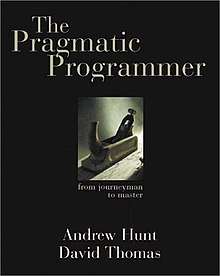The Pragmatic Programmer
 | |
| Authors |
|
|---|---|
| Country | US |
| Subjects | Education, Teaching |
| Published | 1999 by The Pragmatic Bookshelf |
| Pages | 320 |
| ISBN | 978-0-2016-1622-4 |
| Website | The Pragmatic Bookshelf: The Pragmatic Programmer |
The Pragmatic Programmer: From Journeyman to Master is a book about software engineering by Andrew Hunt and David Thomas, published in October, 1999, first in a series of books under the The Pragmatic Bookshelf label. It is an influential book in software engineering,[1] and it is used as textbook in related university courses.[2]
The book does not present a systematic theory, but rather a collection of tips to improve the development process in a pragmatic way. The main qualities of what the authors refer as a pragmatic programmer are being an early adopter, to have fast adaption, inquisitiveness and critical thinking, realism, and being a jack-of-all-trades.[3]
The book uses analogies and short stories to present development methodologies and caveats, for example the broken windows theory, the story of the stone soup, or the boiling frog.[4] Some concepts were named or popularised in the book, like code katas, small exercises to practice programming skills,[5] and rubber duck debugging, a method of debugging whose name is a reference to a story in the book.[6]
References
- Andrew Hunt and David Thomas, The Pragmatic Programmer, Addison-Wesley, 2000.
- ↑
- ↑ "CSE 331 17sp Software Design & Implementation: Information and Syllabus".
- ↑ Hunt and Thomas, pp. xviii–xix.
- ↑ Hunt and Thomas, pp. 7-9.
- ↑ Steve Fenton (2014). Pro TypeScript: Application-Scale JavaScript Development. Apress. p. 209. ISBN 1430267909.
- ↑ Pete Goodliffe (2014). Becoming a Better Programmer: A Handbook for People Who Care About Code. O'Reilly Media. p. 82. ISBN 1491905581.